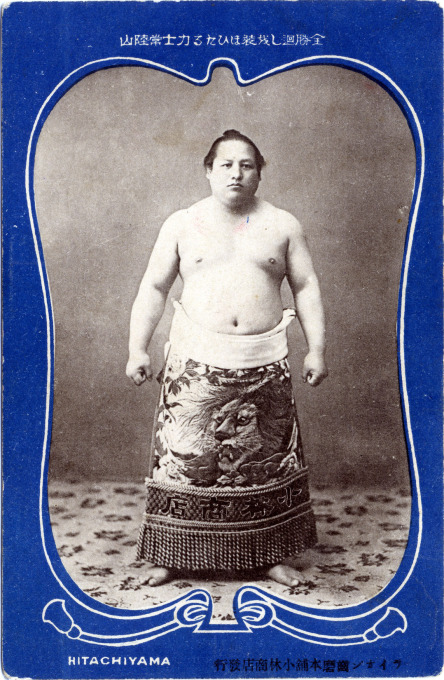“Advocates of Hitachiyama’s greatness were not content to leave it at a single assertion. Recurring evaluations of the origins and continuing basis of his fame almost invariably cited three things to justify claims of greatness: his achievements and skills as a wrestler, his excelled physique and strength, and his dignified character.
“What tied these elements together and made Hitachiyama appealing to so many people was the fact that Hitachiyama also made for a great story.
“… Since Hitachiyama was one of Japan’s earliest sports stars, the narrative elements employed in crafting his story established important precedents, contributing to to the emergence of what I call a sports-star paradigm that shaped – and continues to shape – how later sports celebrities would be viewed and told.”
– Seeing Stars: Sports Celebrity, Identity, and Body Culture in Modern Japan, by Dennis J. Frost, 2010

Sumo wrestler Hitachiyama, c. 1910, a yokozuna [grand champion] from 1903-1914 who did much to popularize sumo into becoming the national sport during the Meiji era.
“Hitachiyama Taniemon (1874 – 1922) was a sumo wrestler from Mito, Ibaragi Prefecture, Japan. He was the sport’s 19th yokozuna [grand champion] from 1903 till 1914. His great rivalry with Umegatani Tōtarō II created the ‘Ume-Hitachi Era’ of wrestling and did much to nationally popularize the sport.
“Hitachiyama is remembered as much for his exploits in promoting the sport as for his strength on the dohyō.
“In his later years as head coach of Dewanoumi stable he trained hundreds of wrestlers, including three future yokozuna. Many consider him the most honorable yokozuna in sumo history, which earned him the nickname kakusei, or ‘sumo saint’.”
– Wikipedia


Pingback: The Human Life Review A “Saint” of the Sumo World - The Human Life Review
Pingback: Sumo wrestlers Kohitachi & Shiunryu, c. 1910. | Old TokyoOld Tokyo